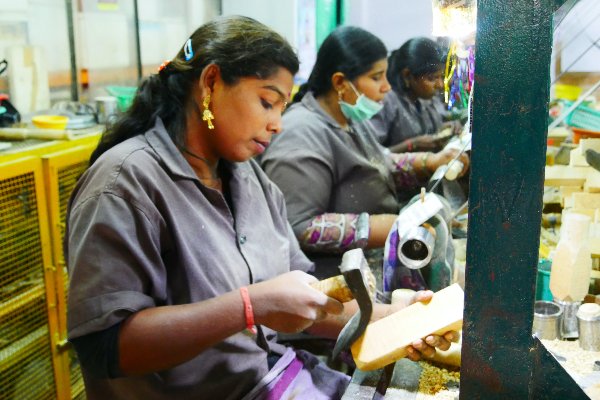For Arshad no one wins if the toy industry carries on this way: time-honoured techniques of making toys with sustainable materials will continue to decline while we fill our environment and children’s bodies with plastic and harmful chemicals.
As the world wakes up to the realities of plastic pollution, ethical alternatives are making a comeback – but not not all wooden toys are created equal.
‘Quite a lot of them could still be coloured with harmful dyes’, Arshad explains; ‘and that’s where Channapatna toys excel.’
These toys are coloured using pigments from nature, such as turmeric, acacia, lime, madder roots and indigo, which are mixed with a naturally occurring food-grade resin and rubbed on the wood.
Leaves from the screw pine plant are then used to buff up the colours for a long-lasting sheen with no chemicals, paints or varnishes in sight.
Popular toys include a Cubby stacking bear, Chip Chop helicopter and Bovow pull-along toy dog.
Empowering women
Each toy available on Ethiqana has been handmade by a small-scale artisan producer and curated along fair trade principles; social welfare, no child labour and employment for women feature heavily in the vetting process.
At the co-operative that supplies Ethiqana’s toys, more than 70% of employees are women – ranging from the artisans to office staff and managers.
Ethiqana’s approach was rewarded with British Association of Fair Trade Shops & Suppliers (BAFTS) certification in February 2022.
Fair prices are fundamental to Arshad’s approach to business, possibly inspired by haunting memories of the haggling that devastated Delhi’s artisans.
‘We don’t negotiate prices’, he explains. ‘You wouldn’t go into a supermarket and start bargaining, so why do it to artisans whose talents we are trying to preserve?’
From a launch group of 40, Ethiqana now works with around 150 artisans. ‘That means all these people have had livelihoods saved and their arts and crafts preserved’, Arshad says.
 Play Video about This Rock Might Just Save The World
Play Video about This Rock Might Just Save The World Play Video about Play 2 hours of rock
Play Video about Play 2 hours of rock Play Video about Play 2 hours of brook
Play Video about Play 2 hours of brook Play Video about Play 2 hours of sheep
Play Video about Play 2 hours of sheep











































